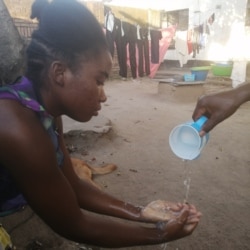After the novel coronavirus burst out of China in January, experts have been fearing catastrophic impacts on developing nations with weak health care systems.
So far, though, the highest death tolls have been reported in wealthier nations in Europe and in the United States.
On a widely used map from Johns Hopkins University, the red dots representing the number of confirmed cases shows a notable north-south divide. Sub-Saharan Africa in particular appears to have relatively few infections.
Experts have suggested a number of reasons:
Testing gaps - There is a saying among scientists that absence of evidence is not evidence of absence. Many low- and middle-income countries lack the capacity to test and identify infected people. The disease may well be spreading undetected.
Low connectivity - The places where the coronavirus reached first are the places with the most connections to its country of origin, China. Travel to sub-Saharan Africa, "while it's pretty brisk, it's much less than travel between Europe the U.S. and China," Harvard University epidemiologist Megan Murray said.
The pandemic is likely to arrive a few weeks later than it did in more connected areas, but it will arrive, experts say.
Fewer people at risk. When the pandemic does arrive, developing countries may be at a slight advantage because of their demographics. The elderly are hardest hit by COVID-19, and demographics skew much younger in the developing world. More than 60% of Africa's population is under 25 years old, according to the World Bank. Just over 5% is 60 and over. In Asia, that figure is about 12%. Europe, by contrast, is about 24% 60 and older, and North America is 21%.
Population density - The developing world is home to some densely populated megacities that may be tinderboxes of viral transmission. But it also encompasses large rural areas where social distancing is not a public health recommendation, it's a way of life. That might be slowing down the epidemic in some developing countries.
On the other hand, individual households may have more people in them and a wider range of ages than in industrialized countries. That could exacerbate the impacts if and when the disease does arrive.
Climate? Probably not - While the virus may spread more easily in the cold, dry air of temperate-zone winters, experts note that heat and humidity have not stopped it from spreading in places like Singapore and Hong Kong.
While the developing world has not yet borne the brunt of COVID-19, experts say the consequences could be devastating when it does arrive, as health systems will be quickly strained to their limits.
Hand washing and social distancing, the strategies that the industrialized world has relied upon to tamp down the outbreak, are "simply not practical for most of sub-Saharan Africa," University of Washington global health expert Kingsley Ndoh wrote in The Seattle Times.
Water for washing is less readily available in poor rural areas and urban slums.
And while stay-home orders have dramatically slowed western economies, they would spark an epidemic of hunger in developing countries, where poverty already is concentrated.
"How do you survive a lockdown when you depend on your daily labor to eat?" World Health Organization Director-General Tedros Ghebreyesus noted.
Ndoh said encouraging people to wear masks could help slow the spread where other options aren't available. Religious leaders may be more trusted messengers than government officials in many places, he said.
He points to low-cost tests being developed in Senegal and a Nigerian ethanol factory mass producing hand sanitizers as bright spots.
With case counts still relatively low, Ndoh added, "there is still a window of opportunity for African governments to implement 'Afrocentric' solutions in the battle against this pandemic."


